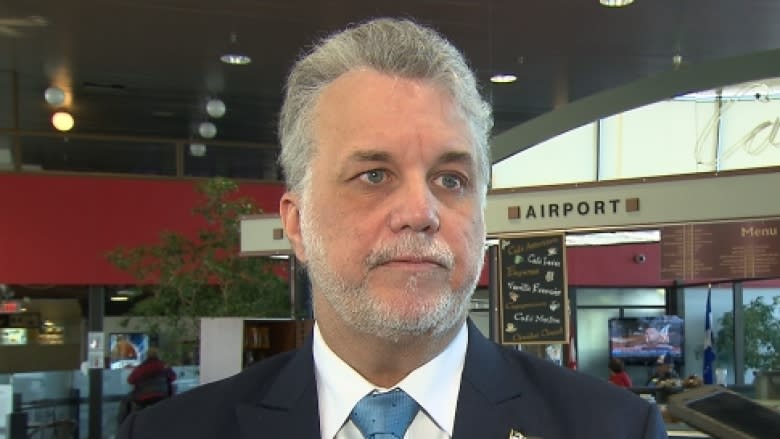Philippe Couillard blames Parti-Québécois for Anglo-Franco divide
Quebec Liberal Leader Philippe Couillard says he's "worried" by the results of a CBC-commissioned EKOS Research poll, which suggest that half of Quebec's anglophone and allophone population have considered leaving the province in the past year.
Couillard said anyone who lives in the province is a Quebecer— no matter what language they speak.
“I don’t want us to start raising barriers between anglophones and francophones,” he said.
He blamed the Parti-Québécois’s government for creating division with its proposed secular charter.
"It’s not good news," Couillard said.
He blamed the separatist government for creating "instability" and said in order to keep Quebecers here, the government needs to focus on restoring the economy, rather than divisive policies.
Quebec Premier Pauline Marois, leader of the Parti-Québécois, would not comment on the poll when questioned by journalists on Tuesday evening.
However, provincial Health Minister Réjean Hébert did speak publicly this morning and said the government has treated non-francophone communities in Quebec well.
He said anxiety among those groups is inevitable and there isn't much the government can do about it. He also said there's been no exodus from Quebec and that out-migration happened "years ago."
In the second part of CBC's Stay or Go Series, the EKOS survey asked more than 2,000 Quebecers why they choose to live in the province.
Among those surveyed, almost half of anglophones and allophones who live in Quebec said that their loved ones are what keep them in the province.
The poll suggested that 47 per cent of anglophones and 41 per cent of allophones are staying in the province because their family and friends are in Quebec.
That was the case for Meghan Low, who grew up on Montreal’s West Island.
Low moved to Toronto for work, but was back in Montreal before long.
“It's a great city … but I think what makes it home, for me, is just the people,” Low said.
Longtime Montrealer Janet Torge left the city in 1991 to move back to Ohio, where she grew up.
Torge said her son had learning disabilities, and she felt it would be best for his education to move to the United States.
“There was a bit of anger in me. I felt like I had to leave — for my kid at least,” she said.
But Ohio never felt like home. Six years later, Torge had found her way back to Montreal.
“I missed the coffee, I missed the terraces … Montreal fit with me. It fit better even than where I came from.”
Torge said she has advice for those who are fed up with Quebec politics:
“Leave! You'll either find a comfort level somewhere else, or you won't and you'll come back,” Toge said.
Our exclusive poll found that after loved ones, work was the second most common reason anglophones said they are staying in Quebec.
About 19 per cent of anglophones said they are staying put because of their jobs
Quality of life was the main reason cited by 17 per cent of those polled.
For allophones, the results were reversed — quality of life was cited by 17 per cent, while 14 per cent said work was the reason they stayed in Quebec.
Of the francophones who were polled, 29 per cent said they continue to live in Quebec because of family and friends, while 23 per cent said quality of life is the main reason they stay.
Just 13 per cent of francophone respondents said their jobs are what keep them in Quebec.
As part of an exclusive two-week series, CBC Montreal will look at what is pushing people to consider leaving Quebec, what is keeping them in the province, and what hopes they have for their future in Quebec.
A total of 2,020 Quebec residents were interviewed by phone between Feb. 10 and 18, 2014, as part of this CBC-commissioned EKOS study. The margin of error for a sample of 2,020 is plus or minus 2.2 percentage points, 19 times out of 20.
Those surveyed included 782 anglophones (with a margin of error of plus or minus 3.5 percentage points 95 per cent of the time), 1,009 francophones (with a margin of error of plus or minus 3.1 percentage points 95 per cent of the time) and 223 allophones (with a margin of error of plus or minus 6.5 percentage points 95 per cent of the time).
Anglophones are respondents who identified their mother tongue as English; francophones are people who identified their mother tongue as French; and allophones identified their mother tongue as "other."
Percentages for total respondents have been weighted to reflect linguistic population make-up of Quebec.



